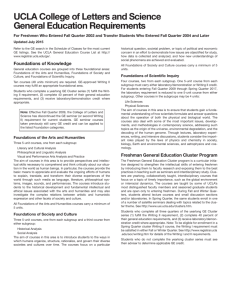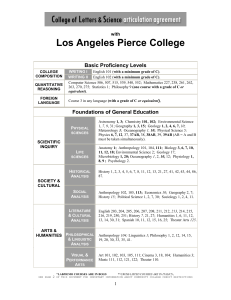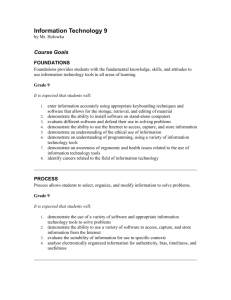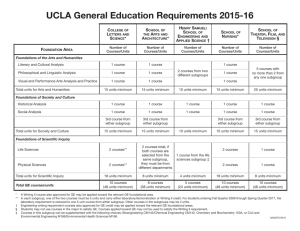UCLA School of the Arts and Architecture
advertisement
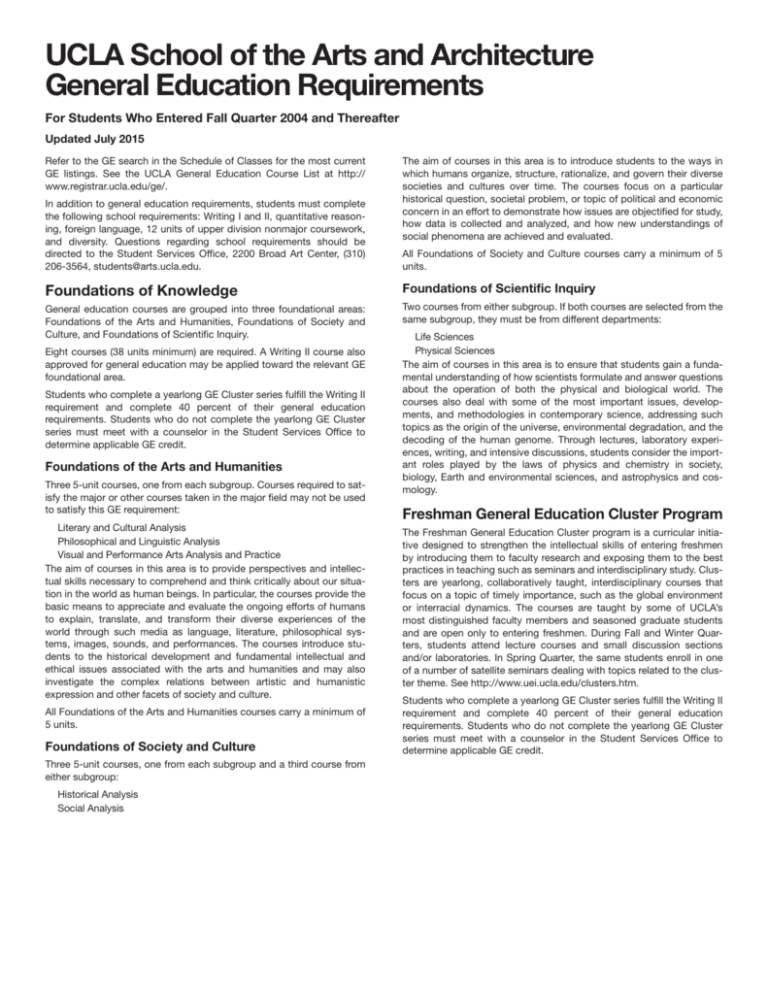
UCLA School of the Arts and Architecture General Education Requirements For Students Who Entered Fall Quarter 2004 and Thereafter Updated July 2015 Refer to the GE search in the Schedule of Classes for the most current GE listings. See the UCLA General Education Course List at http:// www.registrar.ucla.edu/ge/. In addition to general education requirements, students must complete the following school requirements: Writing I and II, quantitative reasoning, foreign language, 12 units of upper division nonmajor coursework, and diversity. Questions regarding school requirements should be directed to the Student Services Office, 2200 Broad Art Center, (310) 206-3564, students@arts.ucla.edu. The aim of courses in this area is to introduce students to the ways in which humans organize, structure, rationalize, and govern their diverse societies and cultures over time. The courses focus on a particular historical question, societal problem, or topic of political and economic concern in an effort to demonstrate how issues are objectified for study, how data is collected and analyzed, and how new understandings of social phenomena are achieved and evaluated. All Foundations of Society and Culture courses carry a minimum of 5 units. Foundations of Knowledge Foundations of Scientific Inquiry General education courses are grouped into three foundational areas: Foundations of the Arts and Humanities, Foundations of Society and Culture, and Foundations of Scientific Inquiry. Two courses from either subgroup. If both courses are selected from the same subgroup, they must be from different departments: Eight courses (38 units minimum) are required. A Writing II course also approved for general education may be applied toward the relevant GE foundational area. Students who complete a yearlong GE Cluster series fulfill the Writing II requirement and complete 40 percent of their general education requirements. Students who do not complete the yearlong GE Cluster series must meet with a counselor in the Student Services Office to determine applicable GE credit. Foundations of the Arts and Humanities Three 5-unit courses, one from each subgroup. Courses required to satisfy the major or other courses taken in the major field may not be used to satisfy this GE requirement: Literary and Cultural Analysis Philosophical and Linguistic Analysis Visual and Performance Arts Analysis and Practice The aim of courses in this area is to provide perspectives and intellectual skills necessary to comprehend and think critically about our situation in the world as human beings. In particular, the courses provide the basic means to appreciate and evaluate the ongoing efforts of humans to explain, translate, and transform their diverse experiences of the world through such media as language, literature, philosophical systems, images, sounds, and performances. The courses introduce students to the historical development and fundamental intellectual and ethical issues associated with the arts and humanities and may also investigate the complex relations between artistic and humanistic expression and other facets of society and culture. All Foundations of the Arts and Humanities courses carry a minimum of 5 units. Foundations of Society and Culture Three 5-unit courses, one from each subgroup and a third course from either subgroup: Historical Analysis Social Analysis Life Sciences Physical Sciences The aim of courses in this area is to ensure that students gain a fundamental understanding of how scientists formulate and answer questions about the operation of both the physical and biological world. The courses also deal with some of the most important issues, developments, and methodologies in contemporary science, addressing such topics as the origin of the universe, environmental degradation, and the decoding of the human genome. Through lectures, laboratory experiences, writing, and intensive discussions, students consider the important roles played by the laws of physics and chemistry in society, biology, Earth and environmental sciences, and astrophysics and cosmology. Freshman General Education Cluster Program The Freshman General Education Cluster program is a curricular initiative designed to strengthen the intellectual skills of entering freshmen by introducing them to faculty research and exposing them to the best practices in teaching such as seminars and interdisciplinary study. Clusters are yearlong, collaboratively taught, interdisciplinary courses that focus on a topic of timely importance, such as the global environment or interracial dynamics. The courses are taught by some of UCLA’s most distinguished faculty members and seasoned graduate students and are open only to entering freshmen. During Fall and Winter Quarters, students attend lecture courses and small discussion sections and/or laboratories. In Spring Quarter, the same students enroll in one of a number of satellite seminars dealing with topics related to the cluster theme. See http://www.uei.ucla.edu/clusters.htm. Students who complete a yearlong GE Cluster series fulfill the Writing II requirement and complete 40 percent of their general education requirements. Students who do not complete the yearlong GE Cluster series must meet with a counselor in the Student Services Office to determine applicable GE credit.
